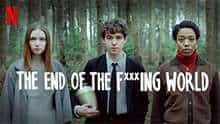 The End of the F***ing World (Netflix) consists of two series of eight episodes each.
The End of the F***ing World (Netflix) consists of two series of eight episodes each.
The first series introduces us to James, a 17 year old English boy who is a misfit and thinks he might be a psychopath. He has killed many animals and feels he should graduate to killing a person. When he meets Alyssa, also 17, he decides she might be a good candidate. Without giving too much of the plot away, they end up on the run together, pursued by a pair of lesbian detectives.
The second series focuses on a new character who stalks the pair, who are no longer together, because of their actions in the first series. It also dives deeper into the personalities of the two lead characters.
There are a number of aspects to The End of the F***ing World that make it fascinating.
First, the performances of the two young leads, Alex Lawther as James and Jessica Barden as Alyssa, are superb. Each character is aware of their social shortcomings and the actors play them totally straight, as uptight, confused, adolescents who don’t know their place in the world but see a gleam of hope in each other. Coming from their respective family backgrounds, that’s not very surprising.
Incidentally, I came to this because I recognised Alex Lawther from a particularly devatstating episode of Black Mirror. Both he and Jessica Barden are definitely actors to watch.
What further lifts the program is the writing of the blackly comic and anarchic story arcs, some highly distinctive directorial techniques and the extraordinary visual style.
In story and characterisation, I was reminded of the novels of S.E. Hinton, Paul Zindel, Alan Garner and Robert Cormier, whose young adult novels dealt with adult themes played out by young teenage characters. This is not Narnia, folks. For a coming of age story, you get the feeling neither of them might make it.
It’s no coincidence for me that those four authors I mentioned wrote some of their best books in the 70s and 80s. The End of the F***ing World could as easily be set then as now and, while the locations are in England, they often look like suburban America. The costumes are equally non-specific, and could be from anything from the 60s to now. The music enhances this even further.
The filming and direction style evoked for me the feel of Wes Anderson and David Lynch. Mostly very static cameras with characters passing through wide shots and many closeups cutting from one character to the other, often with voiceovers speaking for deadpan faces. There are also lots of flashbacks and imagined scenarios, which are filmed in the same style so it’s difficult to tell them apart.
It’s quite clear this is all deliberate and carefully considered, contributing to a distinctive boldness in The End of the F***ing World that I found totally winning. In many ways, it’s angry and grisly and nihilistic and yet it’s also tender and sad and somehow hopeful. And it is shockingly, laugh out loud funny.